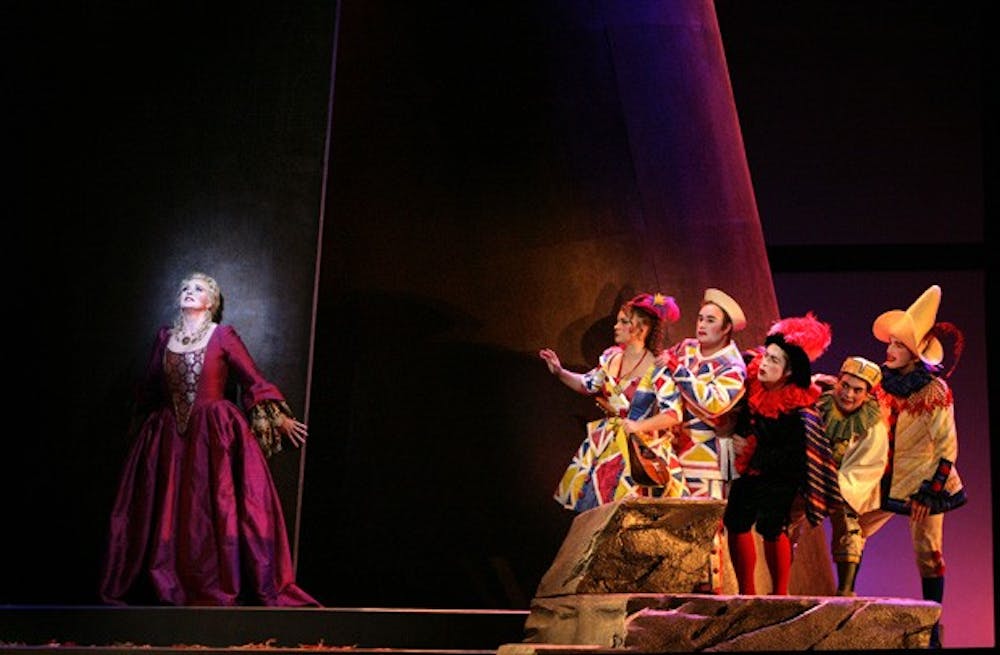Opera audience members were met with more than just impressive singing as Justices Ruth Bader Ginsburg and Antonin Scalia joined the cast of the Washington National Opera’s “Ariadne auf Naxos” on Oct. 24.
Along with Del. Eleanor Holmes-Norton, D-D.C., Professor Martin Ginsburg and arts philanthropist Adrienne Arsht, the Justices played dinner party guests of the “the richest man in town” at WNO’s opening night of Richard Strauss’ early-20th century opera.
The large cast of “Ariadne” contained few weak links. There was no apparent star in the opera. Rather, many singers were given their moment in the spotlight, giving the audience a good sampling of the different voices in the cast.
The opera opens with a composer and his teacher preparing for the debut performance of the composer’s new opera, “Ariadne auf Naxos.” The opera is being performed at the party of a wealthy art gallery owner as a diversion between dinner and a fireworks display, which is set to begin promptly at 9 p.m.
“Ariadne,” the opera within the opera, tells the story of a princess who has been left on an island by her lover. She is waiting for death to come and relieve her from her misery; instead, the god Bacchus comes and takes her away.
The composer is lost in a world of his own creation, conducting silently to himself, disconnected from the world around him. The teacher is lamenting the fact that the opera, a serious and dramatic work, must go on before “The Fickle Zerbinetta and Her Four True Lovers,” a musical comedy.
To add insult to injury, Major Domo, who acts on behalf of the wealthy patron, informs the performers that “Ariadne” and “Zerbinetta” must be performed simultaneously. That is, the two casts must combine their performances into one cohesive show.
Those involved in “Ariadne” consider this to be the worst kind of insult. They do not see how it is possible for a serious work of art to go on next to a silly comedy like “Zerbinetta.” On the other side, performers from “Zerbinetta” see this as an opportunity to save the audience from the boring opera and give them what they really want: a laugh.
The second act, which brings the mash-up of “Ariadne” and “Zerbinetta” to life, was fertile ground for humor, but also for serious reflection from the audience on the definition of art. Are the comedic, lighter moments of the performance, provided by Zerbinetta and her crew, as worthy of the label of art as the dark, dramatic passages?
Irne Theorin played Ariadne with the dignity and commitment one would expect from a traditional opera singer while adding in moments of levity that the ridiculous situation called for. Theorin’s dark tone matched Ariadne’s desolate state, but wasn’t too heavy for the brighter moments of the music.
Perhaps the most stirring performance came from Lyubov Petrova who played Zerbinetta. Petrova sang difficult runs and ear shattering high notes while performing minor acrobatics on a prop piano to the delight of the audience. She gave the most enjoyable performance of the night, which was appreciated with a great amount of applause.
Even though this version of the opera debuted in 1916, the struggle between patrons and artists is alive and well today. Using this reasoning, director Chris Alexander didn’t hesitate to set “Ariadne” in the modern world.
“In these difficult times we artists are in a constant ‘to be or not to be’ situation and very much at the mercy of those who are able to sponsor our work,” Alexander said in an interview from the program.
To find a real life example of this theme, the audience only had to look to the stage. It was clear that the cast was playing to the special guests, bringing them into the action of the opera. At one point, Zerbinetta took a seat in Scalia’s lap causing a good deal of laughter from the audience. Ginsburg played less of a role in the action, but what her presence signified was clear.
Whether or not one believes that performers should have to put up with entertaining those who pay the bills, the bills will always exist. Without patrons, performances could not exist; what good would art be if it could not be appreciated by others?
“Ariadne auf Naxos” runs through Nov. 13. WNO offers discounted tickets through the Generation O program. People between the ages of 18 and 35 can sign up for e-mail alerts from WNO’s website to receive the benefits of the program. All tickets can be purchased by calling (200) 295-2400 or visiting www.dc-opera.org.
You can reach this contributing writer at thescene@theeagleonline.com.





